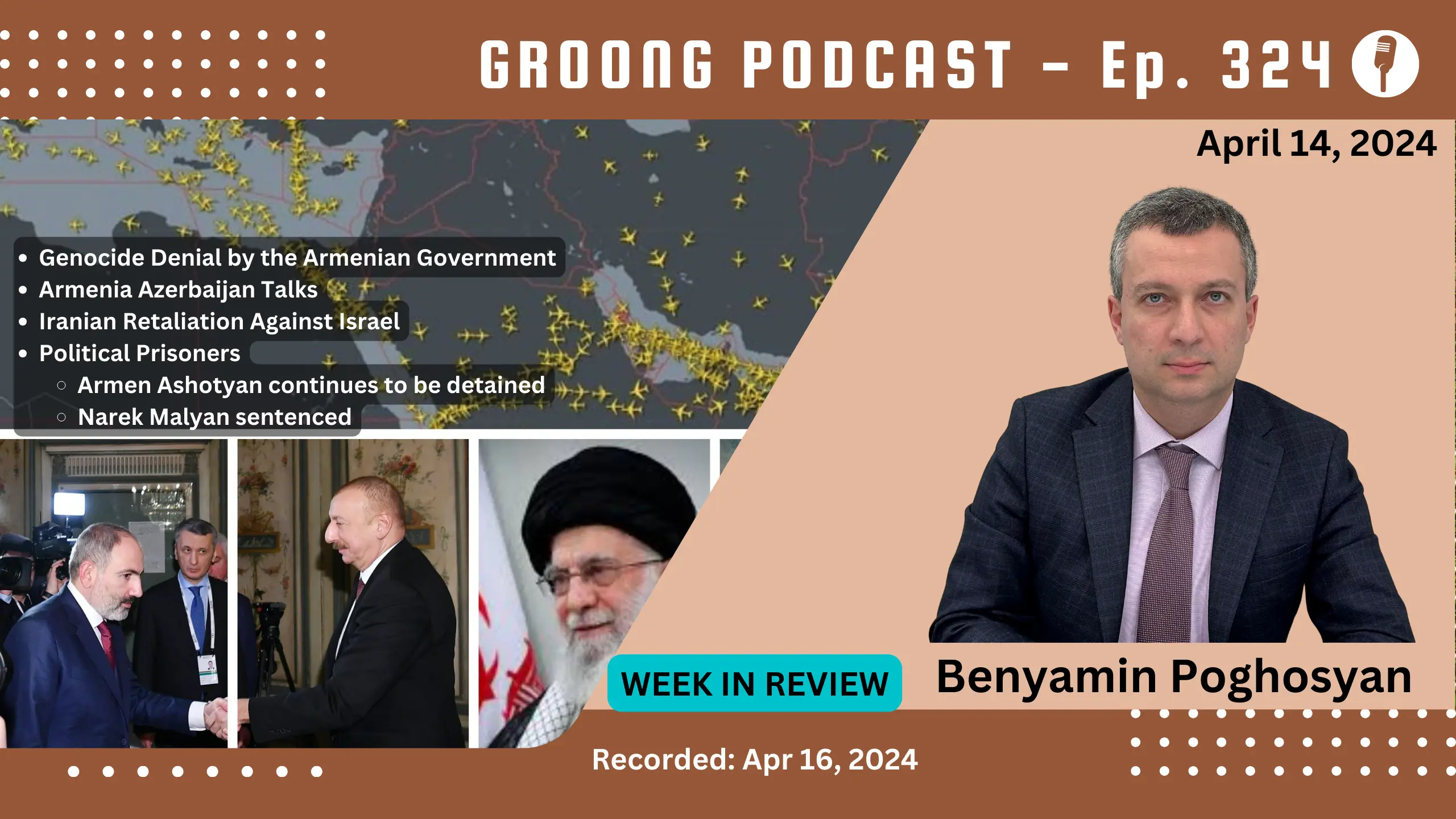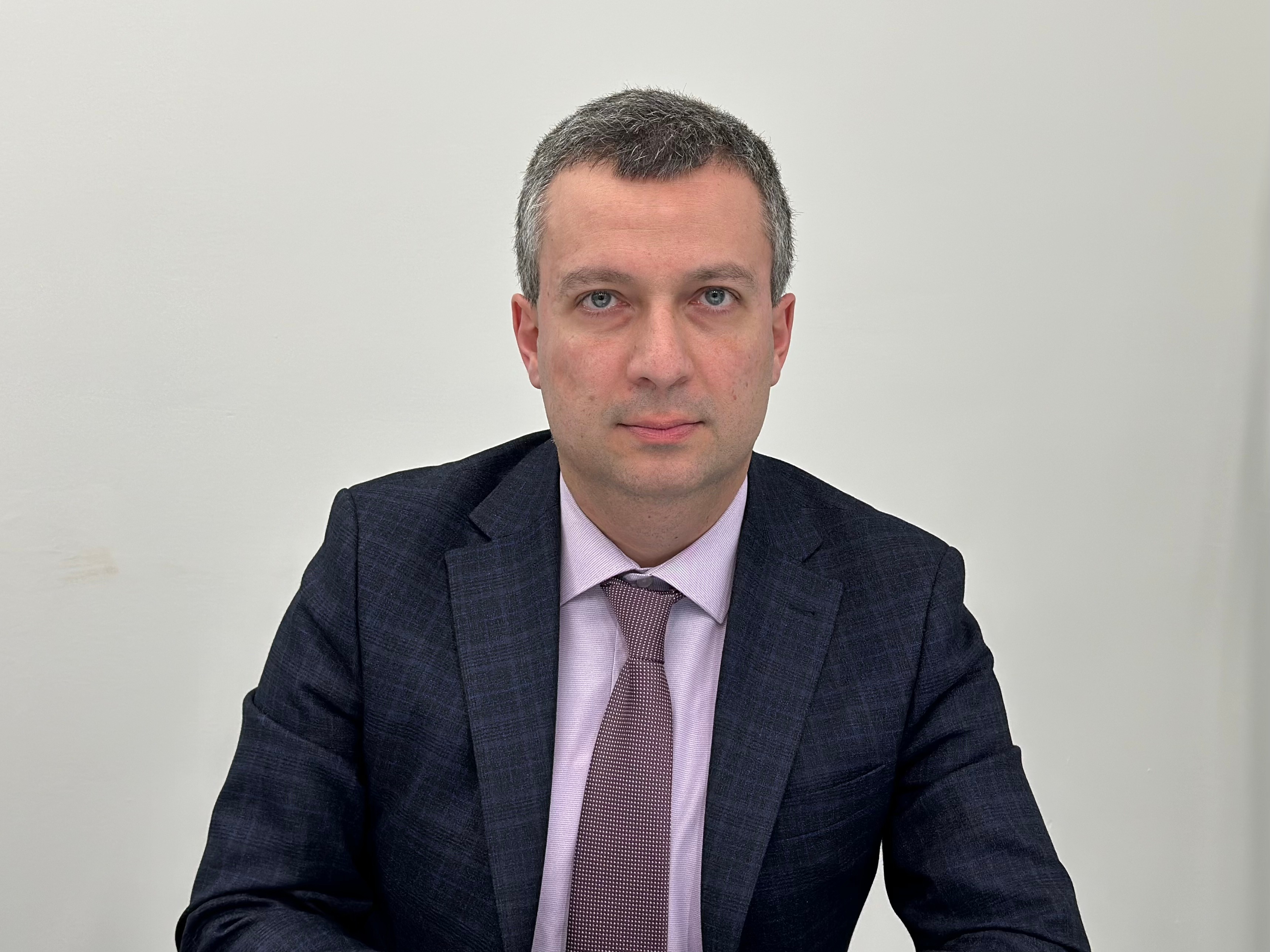
Groong Links:
Guest:
Topics:
- Armenia Azerbaijan Talks
- Iran Amidst Conflicts
- Political Prisoners
Episode 324 | Recorded: April 16, 2024
Show Notes
Armenian Genocide Denial
Every week Pashinyan seems to push the envelope on the narratives that challenge historical realities and themes related to Armenian identity. This is done in a way that would put George Orwell to shame.
“It’s the Russians’ Fault”
First, he opened the week by giving a “lecture” to students, which he records and shares on Tiktok nowadays, where he essentially blames the Russians (or the Soviets) for repatriating to Armenia descendants of the Armenian Genocide. He further blames Russia for stoking the nascent movement to recognize the Armenian genocide in Soviet Armenia. Of course, during the entire time he does this, he doesn’t actually use the term “genocide” a single time.
Challenging The 1.5 Million Number
After opening the topic, Civil Contract members and their satellites started flooding the media with narratives meant to question the Genocide as part of the overall narrative of “we should stop pretending that we live in the historic Armenian homeland and limit ourselves to recognizing that we live in the republic of Armenia”.
Civil Contract MP Andranik Kocharyan said that Armenia should work on establishing a detailed list of all the victims of the Armenian Genocide and record every single name of the 1.5 million victims. This seems like a good idea right? Who wouldn’t want to recognize each and every victim of the Genocide. Let’s forget for a minute that this government to this date refuses to publish the entire list of Armenains who gave their lives in the 44 day war. Andranik Kocharyan continued by saying that if we don’t record the precise name, address and location of each of the 1.5 million victims, then this may give credence to the deniers.
Kocharyan’s statement was received favorably by Diaspora Commissioner Zareh Sinanyan, who said: “I really like what Andranik Kocharyan said. this is the beginning of a scientific approach to genocide recognition.” So in one fell swoop, not only do we need to come up with a list of 1.5 million names and addresses, but apparently also, all the research on the Armenian Genocide today, according to Sinanyan, is not a scientific approach.
NOTE: Let’s remind our listeners that the Turkish government has since the 1960s tried to diminish the total number of deaths and victims in the Armenian Genocide, in classic Genocide denial tactic. Let us also remind our listeners that denying the Armenian Genocide is a crime in some countries of the world and our only intention is to highlight the potential cases of such denial and not to celebrate or perpetuate it.
Questions:
- Is the way that this thesis was brought up by Anrdanik Kocharyan and Zareh Sinanyan problematic? What is problematic about it?
- What is the goal of the Pashinyan team in flooding the media field with all these narratives?
Armenia Azerbaijan Talks
Ten days ago Pashinyan met with Antony Blinken and Ursula von der Leyen, and since then the Armenian government’s anti-Russian stance has continued. This week Ararat Mirzoyan said that he would not attend a meeting of the CIS, continuing the government’s trend to boycott meetings of Russian-led alliances like the CSTO and the EAEU.
In Parliament Pashinyan described the state of negotiations behind closed doors. All we know is that both opposition parties, Hayastan and Pativ Unem, said afterwards that their fears were confirmed that there are no real negotiations, or border discussions, only efforts to manipulate the Armenian public to accept further capitulations to new Azeri demands.
Questions:
- Can you summarize the current state of the Armenian Azeri talks?
- Is the situation as dire as the parliamentary opposition is saying it is?
On the Western Front
Since the high-level US-EU-Armenia meeting, US Ambassador Kristina Kvien said in a recent interview that the US and Armenia have very active defense and security cooperation. This goes a little beyond the previously released “boosting Armenia’s resilience” statements after the meeting.
At the same time, the Armenian government has announced that it will appoint a defense attache to its embassy in London.
Questions:
- Are there serious collaborations going on that are not transparent to the people of Armenia, or are these PR statements to boost support for Pashinyan’s government?
- Where are these relations headed?
- Is there any reason to believe that Armenia’s desire to remove Russia from its border guard duties in Zvartnots airport, and perhaps everywhere else as well, may be related to the desire to import western defense resources into the country?
Over the weekend we read in an exclusive expose in the Times, that the UK would like Armenia to sign an agreement similar to what they have signed with Rwanda to accept their illegal migrants. The Times article mentioned that Armenia began the negotiations with the UK last September. We also know that in November, Armenia was visited by a high ranking delegation from the UK in order to begin a “strategic dialogue” with Armenia. The Armenian MFA did not deny that this topic has been discussed.
Questions:
- What are the dangers of this type of a deal? Is it a good idea for Armenia to even pretend to be interested?
- Why are we hearing about this from leaks in the UK press and not the government in Armenia?
- Is it possible that the UK is making defense cooperation, this so-called “strategic dialogue” with Armenia conditional upon accepting a migrant deal, which has been largely rejected by many countries, as well as the ECHR and other courts?
Iran Amidst Conflicts
Over the weekend Iran launched a large wave of drones coupled with ballistic missiles against Israel, marking the first time Iran has used its own territory in such an attack. It is important to highlight that Iran said its actions were in response to Israel’s attack on the Iranian consulate in Syria by Israel on April 1, which resulted in deaths of military leadership.
At the same time Iran telegraphed its intention for weeks. Iran gave plenty of notice of this slow moving, “massive attack” that took according to CNN 5 hours to journey from Iran to Israel, over Iraqi and Jordanian airspace.
Israel claims that hardly any damage was done to targets within the country, while Iranian sources claim that despite support from US, British, and Jordanian air defenses, Iranian missiles were able to penetrate highly sensitive military targets in Israel.
Questions:
- How serious was this retaliation by Iran?
- What was Iran’s message with this operation? Who was it aimed at?
- Do you believe that Israel will retaliate?
The Armenian View
Iran continues to warn the Armenian government against turning the country into a geopolitical football field for non-regional powers,
Questions:
Is Iran too busy with Israel to defend its red lines in the South Caucasus?
How should Armenia react to the potential of escalation in this conflict?
Note: Pashinyan rejected this during his parliamentary appearance and said that for all of the last 30 years Armenia was an object of geopolitical games, and that he was trying to put a stop to it. He mentioned the OSCE MG, with co-chairs France, Russia and the US, as a manifestation of those geopolitical games.
Political prisoners
In Armenia, the so-called “bastion of democracy”, two political prisoner cases made the news this week.
Armen Ashotyan case
First, Armen Ashotyan’s pre-trial detention was extended by another 3 months last week.
This case has been criticized by international organizations:
- The IDC-CDI has condemned Ashotyan’s detention, calling it “politically motivated”.
- The European People’s Party has also spoken out against Ashotyan’s detention, which lacks “substantial evidence” in their words.
Ashotyan maintains his innocence.
- One hint that this is a politically motivated double-standard is that none of the intermediaries that are accused to have helped Ashotyan are under arrest. Only he is.
- Another glaring hint is that the entire parliamentary opposition went to the courtroom to provide personal guarantees in order to release Ashotyan on bail. Yet, “no luck”.
- Meanwhile, in a clear example of double standards, most Civil Contract members gave guarantees to Alen Simonyan’s sister in law, who was promptly released on bail.
Narek Malyan case
On Friday, a court of first instance in Yerevan found that Narek Malyan engaged in “public calls for violence”. Malyan has been in pre-trial detention since last September and he will serve another 5 months and some days behind bars, according to the sentence.
The key evidence used to prosecute him was edited out of context and the original evidence was not presented in court.
Questions:
- Ashotyan and Malyan are the most prominent of such cases of opposition members being jailed amidst allegations of political motivations. Do you believe that the Pashinyan regime is prosecuting opposition members in a politically motivated manner?
Topics from the Participants
- Hovik: Western diplomats in Armenia, please attend court trials, and ask why Armenia has political prisoners today? Ust like Svitalsky who used to call Naira Zohrabyan every occasion to ask explicitly about the status of political prisoners.
- Benyamin: Artsakh ethnic cleansing was a second genocide, we need to learn from our history in order to move forward.
- Asbed: Continuing government apathy, unaccountability and irresponsibility in the face of mounting non-combat deaths and injuries in the Armenian military
Wrap-up
That’s our Week in Review, we hope you found it helpful. We invite your feedback and your suggestions, you can find us on most social media and podcast platforms. Thanks to Laura Osborn for the music on our podcasts.
Guests

Benyamin Poghosyan
Dr. Benyamin Poghosyan is a Senior Research Fellow at APRI Armenia, a Yerevan based think tank,and the Chairman of the Center for Political and Economic Strategic Studies. He has served as the vice president for research and head of the Institute for National Strategic Studies at the National Defense Research University in Armenia. Dr. Poghosyan was a Distinguished Research Fellow at the US National Defense University College of International Security Affairs. He is a graduate from the US State Department Study of the US Institutes for Scholars 2012 Program on US National Security Policy Making. He holds a PhD in history and is a graduate from the 2006 Tavitian Program on International Relations at Fletcher School of Law and Diplomacy.
Hosts

Asbed Bedrossian
Asbed is founder of the Armenian News Network Groong and co-founder of the ANN/Groong podcast.

Hovik Manucharyan
Hovik Manucharyan is an information security engineer who moved from Seattle to Armenia in 2022. He co-founded the ANN/Groong podcast in 2020 and has been a contributor to Groong News since the late 1990s.
Disclaimer: The views expressed by Hovik Manucharyan on the ANN/Groong podcast are his own and do not necessarily reflect the opinions of his employer or any other organization.